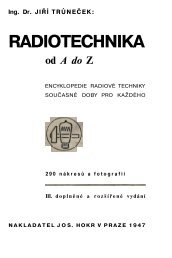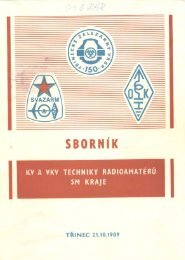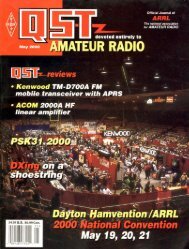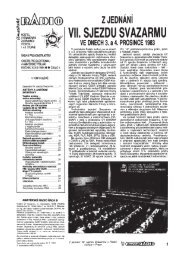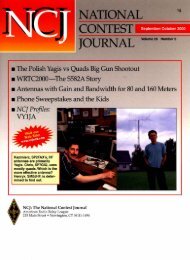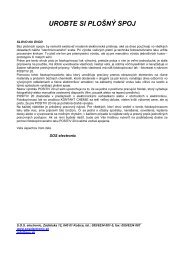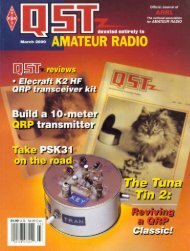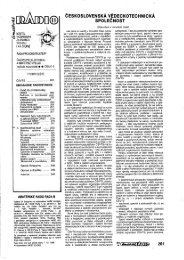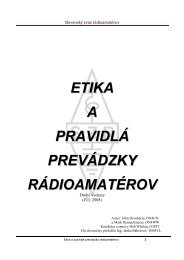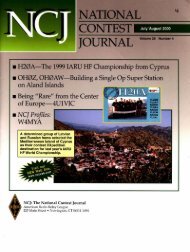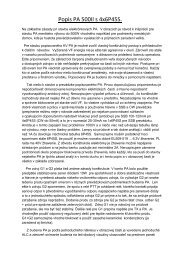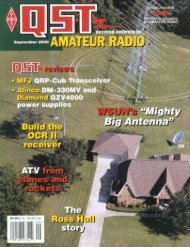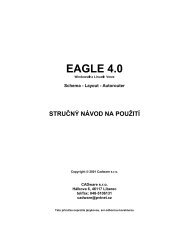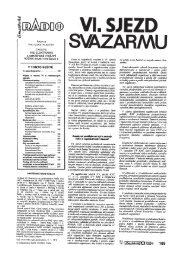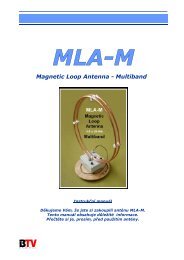Create successful ePaper yourself
Turn your PDF publications into a flip-book with our unique Google optimized e-Paper software.
fill in other required information such as<br />
date, time, band, prefix, country, etc. The<br />
logging program takes care of “dupe<br />
checking,” too, warning us when we’ve<br />
already worked a station on that band. The<br />
logging program computes your score and<br />
QSO rate throughout the contest, so you<br />
always know how you are doing. At the end<br />
of the contest, you can output your log to a<br />
file and e-mail it to the contest sponsor. The<br />
result is that you get to spend more time<br />
operating in the contest and less time doing<br />
paperwork chores.<br />
The most popular logging programs are<br />
CT, NA, TR-Log and WriteLog. CT, NA and<br />
TR-Log run under MS-DOS, while WriteLog<br />
runs under Microsoft Windows. The MS-<br />
DOS based programs can be run on very<br />
inexpensive IBM-compatible personal<br />
computers with a 286 or greater processor<br />
and minimal configuration. For more<br />
information, get on the Web and go to http:/<br />
/www.contesting.com where you’ll find<br />
links to the home pages for the popular<br />
logging programs.<br />
Entry Categories<br />
Virtually every contest has multiple<br />
entry categories, providing you with many<br />
options for participating. In the standard<br />
Single Operator category, one person does<br />
all of the operating chores, including<br />
sending, receiving and logging, and is<br />
allowed to transmit from only one radio at<br />
a time. Within the Single Operator category<br />
there are usually several power classifications,<br />
including Low Power, High Power<br />
and QRP. The exact power limits vary<br />
depending on the type of contest. In the<br />
Multi-Single category, two or more<br />
operators share the operating chores, but<br />
usually transmit from only one radio at a<br />
time. This is a good choice if you can’t<br />
allocate enough time to work the entire<br />
contest (or can’t stay awake that long!). The<br />
Multi-Two category in the ARRL DX<br />
contest allows two operators to transmit<br />
from up to two radios at a time, on different<br />
bands. The Multi-Multi category allows any<br />
number of operators to use any number of<br />
radios, as long as there is no more than one<br />
transmitted signal on each band.<br />
One of the hot new trends in contesting<br />
is Single Operator Two Radio, or SO2R. This<br />
is a station in which one operator uses two<br />
radios, but only one transmitted signal is on<br />
the air at any time. This allows the station to<br />
compete in the Single Operator category, but<br />
with the advantage of being able to call CQ<br />
on one radio while at the same time tuning a<br />
different band on the other radio. Operating<br />
two radios at the same time is a little like<br />
juggling cats, so I recommend that you get a<br />
lot of experience contesting with one radio<br />
before you try SO2R.<br />
Contest Resources<br />
When you’re ready to get started, the first<br />
thing to do is to get a calendar of upcoming<br />
contests, read the rules, and decide which<br />
contests appeal to you. There’s a contest<br />
calendar in every issue of <strong>QST</strong>, in the<br />
“Contest Corral” department, and the ARRL<br />
Web site at http://www.arrl.org/contests/<br />
has a calendar and rules for all upcoming<br />
ARRL contests. You can also find contest<br />
calendars and rules on various contest<br />
websites, including http://contesting.com,<br />
http://www.sk3bg.se/contest/, http://<br />
www.cq-contest.com/, and http://www<br />
.hornucopia.com/contestcal/. A great<br />
magazine resource for contest news and<br />
information is the National Contest Journal.<br />
You can subscribe by calling toll free at<br />
1-888-277-5289 between 8 AM and 8 PM<br />
Eastern Time, Monday through Friday.<br />
Try “The ARRL Big Three”<br />
Within the next few months you’ll find<br />
three popular contests that are perfect for<br />
beginners:<br />
• ARRL <strong>November</strong> Sweepstakes<br />
ARRL <strong>November</strong> Sweepstakes is one of<br />
my favorite contests, and I try to participate<br />
every year. Since the contest is limited to the<br />
United States and Canada (W/VE), excellent<br />
scores are possible even from modest stations.<br />
It’s also a great way to accumulate states for<br />
the WAS and 5BWAS awards. The object is<br />
to work as many W and/or VE stations as you<br />
can in no more than 24 of the 30 hours of the<br />
contest (from 2100 UTC Saturday to 0300<br />
UTC Monday). There are separate contest<br />
weekends for CW (<strong>November</strong> 4-6) and Phone<br />
(<strong>November</strong> 18-20). Sweepstakes entry<br />
categories are Single Operator Low Power<br />
(150 W or less), Single Operator High Power<br />
(over 150 W), Single Operator QRP (5 W or<br />
less) and Single Operator Unlimited/Assisted<br />
(use of packet spots is allowed), Multi-Single,<br />
and Club. There’s no Multi-Multi category.<br />
Complete rules for ARRL <strong>November</strong><br />
Sweepstakes may be found elsewhere in this<br />
issue, or on-line at http://www.arrl.org/<br />
contests/announcements/rules-novss.html.<br />
• ARRL 10-Meter Contest<br />
Trying for 10-meter WAS, DXCC or<br />
5BDXCC Then the ARRL 10-Meter<br />
Contest is for you! It’s a great DX contest,<br />
even for small stations. The object of the<br />
contest is to work as many stations as<br />
possible on the 10-meter band in no more<br />
than 36 of the 48 hours of the contest (from<br />
0000 UTC Saturday to 2400 UTC Sunday).<br />
The contest takes place on a single<br />
weekend, December 9-10, so the CW and<br />
Phone portions are combined. The ARRL<br />
10-Meter Contest has Single Operator (Low<br />
Power, High Power, QRP). In the Single<br />
Operator categories you can work CW only,<br />
Phone only, or Mixed (both CW and<br />
Phone). The only other category is Multi-<br />
Single, which is mixed mode only.<br />
You’ll find complete rules for ARRL<br />
10-Meter Contest elsewhere in this issue,<br />
or at http://www.arrl.org/contests/<br />
announcements/rules-10M.html.<br />
• ARRL January VHF Sweepstakes<br />
You don’t have an HF rig or antenna<br />
The ARRL January VHF Sweepstakes may<br />
be just the ticket for you. It’s the big Winter<br />
contest for VHF and UHF enthusiasts, and<br />
you can do very well with modest<br />
equipment and antennas. You can even<br />
operate with your mobile FM rig or an H-T.<br />
The object of this contest is to work as<br />
many stations as possible in as many “grid<br />
squares” as possible using authorized<br />
frequencies above 50 MHz. The contest<br />
lasts 33 hours and takes place the weekend<br />
before the NFL Super Bowl (1900 UTC<br />
Saturday January 20 to 0400 UTC Monday<br />
January 22).<br />
The January VHF Sweepstakes<br />
designates grid squares as multipliers. For<br />
more information on grid squares, see the<br />
April 1994 issue of <strong>QST</strong>, page 86. Even<br />
better, surf to http://www.arrl.org/locate/<br />
gridinfo.html. There you will find a link<br />
to the <strong>QST</strong> article, along with links to a Web<br />
page and a program for your PC that will<br />
compute the grid square for any set of<br />
coordinates. You can work each grid square<br />
once per band for multiplier credit.<br />
A Roving Rover<br />
Rover is a special category unique to<br />
contests above 50 MHz. It’s designed for<br />
operators of mobile stations that move<br />
among two or more grid squares during the<br />
contest. In addition to the grid squares of<br />
stations they work, Rovers can count each<br />
grid square from which they make a<br />
contact as a multiplier. The rules allow<br />
either one or two operators for a Rover<br />
station, so you can hop in the car with a<br />
buddy and have some real fun driving from<br />
one grid square to another making contacts.<br />
Complete rules for ARRL January VHF<br />
Sweepstakes may be found in the December<br />
issue of <strong>QST</strong> or at http://www.arrl.org/<br />
contests/announcements/01vhfss.html.<br />
You can contact the author at 190 Lyme<br />
Rd, Hanover, NH 03755-6602; dick.green<br />
@valley.net.<br />
44 <strong>November</strong> <strong>2000</strong>



